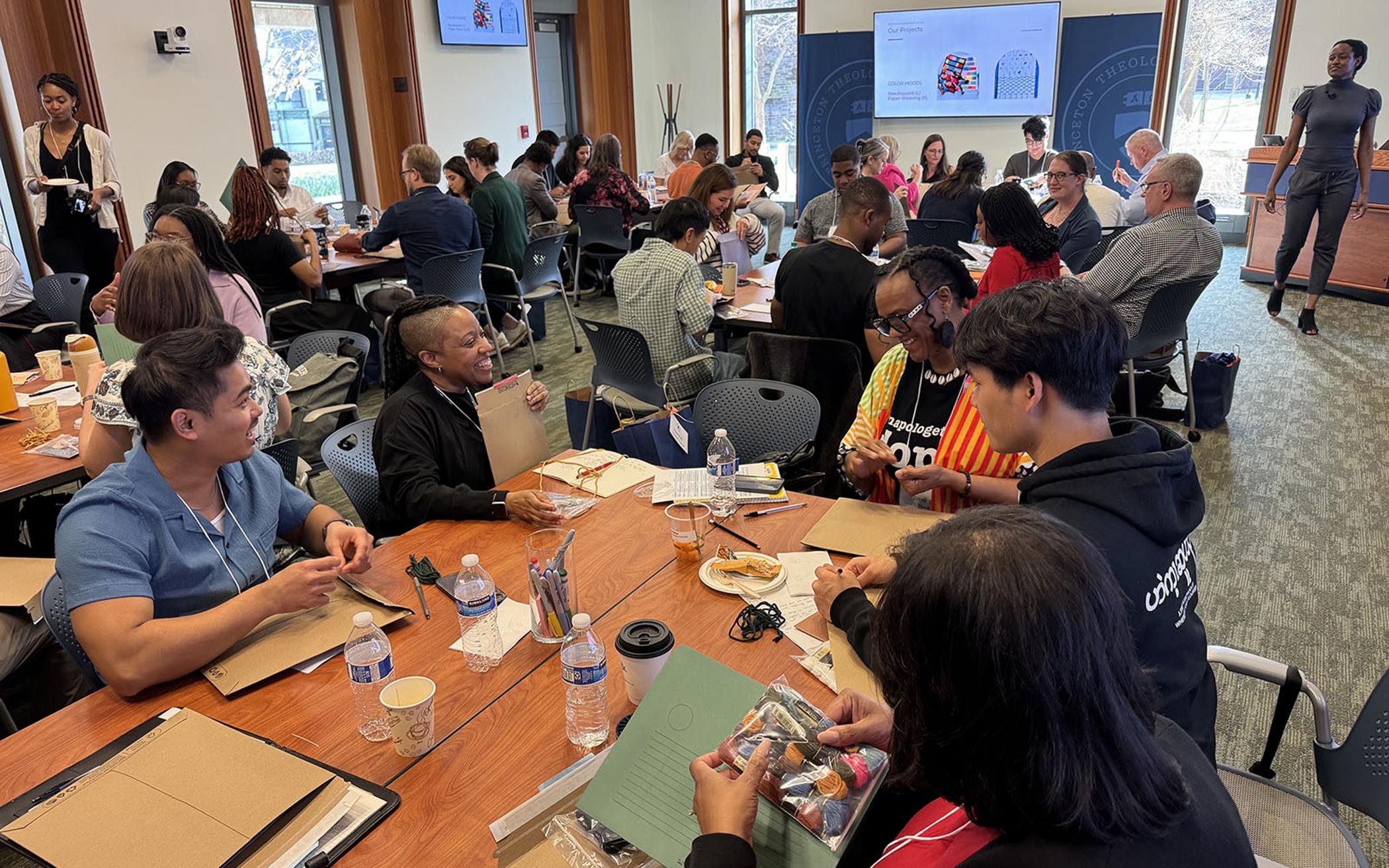The Banner has a subscription to republish articles from Religion News Service. This story by Katryn Post, was published May 16, 2025 on religionnews.com. It has been edited for length and Banner style. Some details from Calvin Theological Seminary were added to the second-to-last paragraph as context for the Christian Reformed Church.
On a Tuesday evening in early April, an audience sat enraptured in Princeton Theological Seminary’s dining hall as, one by one, adults in their 20s walked up to a platform, took the microphone and shared a story.
“I realized that if God made our bodies this intricate, shouldn’t the care we give others be just as intricate?” Jewel Koshy asked.
“I allowed Jesus to look at me, and I looked at him, and my life was completely transformed,” Betty Freymann said.
“How can we stay inquisitive in a world where excellence is expected and assimilation is often rewarded?” Ray’Chel Wilson asked. “For me, I take my questions to God.”
Despite the setting, the young adults speaking weren’t seminarians: They were entrepreneurs, nonprofit leaders, health care workers and other professionals at a summit as part of the Polaris Young Adult Leadership Network, a new initiative from Princeton Theological Seminary that aims to equip young Christian leaders to find their calling beyond parish ministry.
“If you lead in the public sector, if you are an artist or a business leader or an educator, and you’re deeply motivated by your Christian faith, we think theological education has something to offer there as well,” said Shari Oosting, project director of the Polaris Network.
In recent years, many U.S. seminaries have faced existential threats fueled by the COVID-19 pandemic and a changing religious landscape. As organized religion continues to see less participation from Generation Z (those born in the late 1990s to mid 2010s), some seminaries are downsizing, combining and embracing online and hybrid models. They are also offering different certificate programs or degrees tailored for non-clergy students. Some seminaries target retired or second-career students, while others are designing programs to help young adults live out their spirituality beyond seminary walls.
Freymann, 28, a Dallas-based tech consulting manager and a participant at the Polaris summit, said meeting other Christians doing “the Lord’s work” in the secular world has made her feel less alone.
“I love that we’re pushing to form Christian leaders. Not Catholic, not Presbyterian, not Episcopal leaders, but Christian leaders,” said Freymann, who is Catholic and hosts a Spanish-language podcast for Latino Catholics.
Launched in 2023 with a $4 million grant from the Lilly Endowment, the Polaris Young Adult Leadership Network convenes cohorts for lectures and discussion while also offering sub-grants to fund participants’ local ministry efforts and provide workshops on topics like mental health, vocational discernment and sustainability. The aim is to combat isolation among young Christian leaders and counteract the narrative that all young people are losing their faith.
“In a lot of ways, these young people are teaching us how to be a seminary for the next generation,” said the Rev. Kenda Creasy Dean, the Mary D. Synnott professor of Youth, Church and Culture at Princeton Theological Seminary and one of the architects of Polaris.
Built to train pastors, many seminaries like Princeton are increasingly welcoming students looking to discern their calling rather than intending to work at a congregation. Dean said she has observed that pastoral credentials don’t have the draw they used to for students, which is mirrored in trends at the seminary.
While enrollment in its Master of Divinity program—a prerequisite for many seeking ordination—has declined in recent years (down to 155 students in the 2024-2025 school year, from 245 students in 2020-2021), Princeton’s master’s programs for leaders interested in theology/sustainability and in justice/public life have grown steadily since being launched in 2023. The seminary has also seen growth in part-time, hybrid, and online offerings. And this year, it saw the largest incoming class of degree-pursuing students in the past five years.
Data from the Association of Theological Schools, an umbrella group of over 270 schools including the Christian Reformed Church in North America’s Calvin Theological Seminary, show Princeton isn’t alone. Enrollment in Master of Divinity programs among ATS member schools is down roughly 14% since 2020, a dip that has been offset by boosts in two-year, often customizable Master of Arts programs and non-degree enrollment. Overall ATS schools show a 1.8% increase in enrollment since 2020. Calvin seminary’s report to Synod 2025 shows 45 students in its Master of Arts in leadership formation program, about 13% of the school’s 343 degree-seeking students enrolled in all programs, as of fall 2024. The school also reports launching a new Master of Arts in clinical mental health counseling in fall 2023. The report quotes program director Danjuma Gibson describing the goal of the program “to train students who will be competent and skilled in the ethical integration of Christian faith, spirituality, and counseling in a way that promotes healing and shalom in the lives of individuals and communities.”
Dean, of Princeton seminary, said, “Everybody’s in a massive period of experimentation,” noting “desperation is a spiritual gift, and so it gives you a chance to experiment with things that, you know, 10 years ago were off the table. That’s happening everywhere, and we are no different in that.”
Religion News Service receives funding from Lilly Endowment.
About the Author
Religion News Service is an independent, nonprofit and award-winning source of global news on religion, spirituality, culture and ethics.

